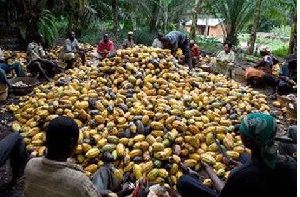 Staff threatens to demonstrate if management fails to increase salaries.
Staff threatens to demonstrate if management fails to increase salaries.
The staff of Ghana Cocoa Board (COCOBOD) are demanding salary increment despite a myriad of challenges, including the huge fall in the price of raw cocoa beans on the world market and GH¢10 billion debt overhang inherited by the new management.
Text messages being circulated among COCOBOD workers and sighted by The Finder is soliciting support for demonstrations against the new Chief Executive if management fails to increase salaries soon.
The price of cocoa on the world market has fallen from $3,000 in June last year to about $1,900 currently. Farmers paid $400 more than world market price
Despite this fall in price, government is paying cocoa farmers $400 more for one tons of cocoa than the current world market price. The government is forced to pay because of the forward sale policy which offers farmers guaranteed price for the commodity agreed with farmers long before harvesting time.
With these challenges, COCOBOD Chief Executive, Joseph Boahen Aidoo, has hinted that government may not be able to pay farmers annual bonuses for the 2016/2017 season.
But, when contacted, General Secretary of the Industrial and Commercial workers Union (ICU), Solomon Kotei confirmed to The Finder that ICU and General Agricultural Wokers Union (GAWU) are set to commence negotiations.
The over 4,000 workers of COCOBOD belong two unions, namely ICU and GAWU.
According to Kotei, any increment to be agreed upon would take effect from October 2016 since the negotiations would cover 2016/2017 cocoa season.
He explained to The Finder that the negotiations were delayed because of transition challenges.
The workers are demanding the salary increase at a time when Cocoa roads, which accounted for about GH¢3.5 billion of the debt, have been suspended pending the outcome of an ongoing audit.
The demand for salary increment is also coming at a time when the government has to make huge investments into hand pollination and rehabilitation of moribund farms to increase production and save the industry from total collapse.
Currently, 40% of all cocoa trees in Ghana are not productive. Out of the 40%, 17% have been affected by swollen shoot disease while 23% are over 30 years and had become unproductive. The only solution is to cut down all the 40% of cocoa trees and plant new ones which means that government has to investment in free seedlings for the farmers.
Ghana, the second largest producing country in the world, targets to raise production to one million tonnes by 2020, from the current annual output of 800,000 tonnes.
The investments are desperately needed because data from COCOBOD revealed that while farmers in other countries harvest 32 bags of raw cocoa beans from one hectare, some Ghanaian farmers do not even make one bag from a hectare.
A World Bank report released last month stated that corruption and regulatory mismanagement of Ghana's cocoa industry are denting production and harming farmers, underlining the need for reform.
According to the report, a lack of transparency and low prices made it impossible for farmers to plan future crop investments.
"The board (COCOBOD) has been unable to achieve one of its most important goals - to stabilize farm-gate prices at levels that permit farmers to earn an adequate return on their land, labor and capital," the report said.
Instead, COCOBOD, which is also Ghana's sole cocoa exporter, has been more focused on getting a better margin on exports, which increases government revenue in the short term but dents farmers' wages and investment.
The export margin made in Ghana is about double that of neighboring Ivory Coast, the World Bank said. "Successive governments have prioritized revenue collection, treating the final price received by farmers as a secondary consideration rather than an objective," the World Bank said.
"Institutional arrangements and policy framework could greatly increase cocoa output with a minimal budgetary impact," the draft report said.
"COCOBOD also has control over the distribution of fertilizers and disease-controlling chemicals to farmers. Its mismanagement in this area has also hurt production," the World Bank said.
"Distribution is often erratic and is subject to corruption and capricious political interference," the World Bank said.
Sometimes, farmers never receive the supplies, which are often smuggled to neighboring countries.